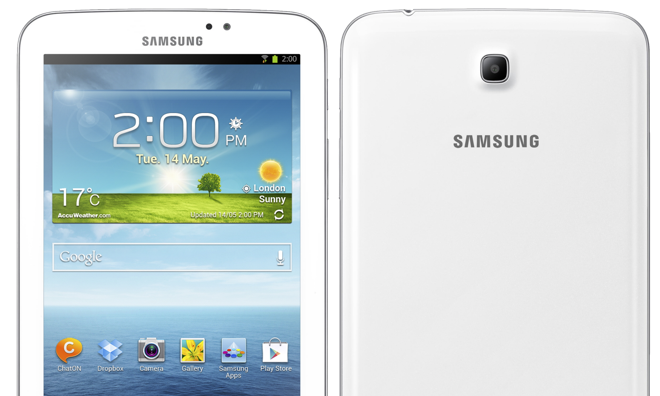With Intel largely absent from the current booming smartphone and tablet markets, the chipmaker has reportedly secured a deal with Samsung to power one of the company's upcoming 10-inch Android tablets.
At least one version of the Samsung Galaxy Tab 3 10.1 will run on Intel's Clover Trail+ mobile chip, Reuters reported this week, citing unnamed sources. The Galaxy Tab 10.1 series is a direct competitor to Apple's full-size 9.7-inch iPad, which has dominated the premium tablet market since it launched in 2010.
Samsung's 7-inch Galaxy Tab 3 debuted in April. A new 10.1-inch model will reportedly feature an Intel CPU.
Samsung's decision to use an Intel chip for an Android device was portrayed as a "coup" for Intel in the report. Most smartphones and tablets currently sold, including Apple's iPhone and iPad, are powered by chips based on ARM reference designs.
Earlier this month, Intel's outgoing CEO Paul Otellini revealed that his company had the opportunity to provide chips for Apple's first iPhone, which kicked off the current smartphone revolution in 2007. But Intel ended up passing on a potential deal with Apple, and Otellini admitted that "the world would have been a lot different if we'd done it."
The rise of smartphones and tablets, which rely on low-power chips and offer strong battery life, has contributed to significant struggles in the PC market, where Intel's CPUs are most common. The latest data from IDC in April showed that traditional PC sales declined 13.9 percent year over year in the first quarter of 2013, marking the largest drop in the industry's history.
While PC sales plummet, sales of tablets — led by Apple's iPad — are surging. IDC predicts that tablet shipments will eclipse notebook PCs this year, and surpass all PCs by the year 2015.
Samsung's new Intel-powered Galaxy Tab 3 could be introduced at a company event in London scheduled for June 20. There the company has promised to show off new Galaxy products, as well as devices from its Windows lineup, branded as Ativ.
As Intel looks to get its foot in the door of the tablet market through Samsung, there have even been rumors for years that Intel could also partner with Apple and build its custom A-series chips for iPhone and iPad. Those claims cropped up again in March, when Reuters suggested that executives from both companies over the past year had discussed a possible partnership that would use Intel's foundries to manufacture Apple-designed chips.
Currently, all of Apple's custom A-series chips are built by Samsung, which is also its chief rival in the smartphone market. Speculation that Apple could partner with Taiwan Semiconductor Manufacturing Co. has also persisted for years, but some reports have suggested that TSMC alone simply does not have the capacity to build enough chips for Apple.
 Sam Oliver
Sam Oliver







-m.jpg)






 Christine McKee
Christine McKee
 Malcolm Owen
Malcolm Owen

 Charles Martin
Charles Martin


 Mike Wuerthele
Mike Wuerthele


-m.jpg)






90 Comments
That's interesting. I'm sure the Samsung semiconductor head isn't happy to lose business to Intel. Intel must have made a compelling case.
That's interesting. I'm sure the Samsung semiconductor head isn't happy to lose business to Intel. Intel must have made a compelling case.
That's been my point too, that there will be divisions within Samsung that are more than happy to do business with Apple.
So what does this mean? Incompatibility with everything made before it?
So what does this mean? Incompatibility with everything made before it?
Yeah I don't get it. So Android will compile x86 and then emulate ARM for the apps?
So what does this mean? Incompatibility with everything made before it?
Exactly what I was thinking. Are there currently x86/x86_64 builds of Android? If not, I assume it's not a huge deal to do it, but then you have to get all the developers to recompile their apps for it. This just seems like a giant mess of work for ... what benefit? It would make more sense that it would be a Windows tablet rather than Android.